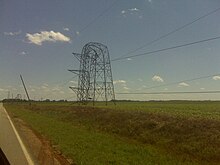2011 Super Outbreak
The 2011 Super Outbreak was a major tornado outbreak that happened during April 2011. It was the biggest tornado outbreak in US history. 362 tornadoes appeared during the outbreak. 4 EF5 tornadoes dropped down along with 12 EF4 tornadoes and 21 EF3 tornadoes. About 321 people died because of the tornadoes.[1][2]
Meteorogical synopsis
[change | change source]April 25
[change | change source]On the evening of April 25, dangerous supercells started forming across Arkansas, Northeast Texas, and Southeast Oklahoma. The supercells then merged into a massive squall line of severe thunderstorms. The severe thunderstorms produced tornadoes. Then, heavy rain formed northwest of the line of severe thunderstorms and tornadoes. An EF2 tornado struck Vilonia, Arkansas, and an EF3 tornado struck Hot Springs Village, Arkansas. Later, the severe thunderstorms and tornadoes moved into Tennessee and Mississippi.
April 26
[change | change source]On April 26, the severe thunderstorms and tornadoes moved back into Texas, Oklahoma, and Arkansas. On the evening of April 26, dangerous supercells formed over Texas. Those supercells produced dangerous tornadoes, like EF2 or EF3. Then, those supecells moved into Oklahoma and Arkansas. The squall line of severe thunderstorms moved back into Tennessee and Mississippi.
April 27
[change | change source]On April 27, the supercells moved into Tennessee and Mississippi, and the squall line of severe thunderstorms moved into Alabama. Then, the supercells moved into Alabama, and produced 4 EF5 tornadoes, 13 EF4 tornadoes, and 23 EF3 tornadoes. The squall line of severe thunderstorms moved into Kentucky, North Carolina, and South Carolina.
April 28
[change | change source]On April 28, the supercells merged into a very large squall line, and moved into Kentucky and the Carolinas. The old squall line of severe thunderstorms moved into Virginia, Maryland, Delaware, New Jersey, and New York. Then later, the new squall line moved into Virginia, Maryland, Delaware, New Jersey, and New York. The storm produced some tornadoes. The other squall lines disappeared. There were five deaths.
Aftermath
[change | change source]
The Governor of Alabama, Robert J. Bentley, declared a state of emergency in Alabama after the outbreak.[3] The tornadoes caused many power outages because power lines were damaged. More than 675,000 homes that the Tennessee Valley Authority served did not have electricity after the storms.[4] Alabama Power said that 370,000 people in Alabama did not have power after the storms.[3]
References
[change | change source]- ↑ "On This Day: 2011 Tornado Super Outbreak". National Centers for Environmental Information. 2017-04-25. Retrieved 2022-08-13.
- ↑ "Revisiting the April 2011 Tornado "Super Outbreak" from Orbit". National Environmental Satellite Data and Information Service. 2021-04-26. Retrieved 2022-08-13.
- ↑ 3.0 3.1 Oliver, Mike (2011-04-28). "Day of devastation in Alabama: At least 128 killed by storms". AL.com. Retrieved 2022-08-13.
- ↑ Sohn, Pam (2011-05-03). "High-voltage power towers 'twisted like bow ties'". Chattanooga Times Free Press. Retrieved 2022-08-13.
